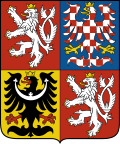
Back دستور التشيك Arabic Конституция на Чехия Bulgarian Ústava České republiky Czech Constitución de la República Checa Spanish قانون اساسی جمهوری چک Persian Constitution de la Tchéquie French Csehország alkotmánya Hungarian Չեխիայի սահմանադրություն Armenian Costituzione della Repubblica Ceca Italian ჩეხეთის კონსტიტუცია Georgian
You can help expand this article with text translated from the corresponding article in Czech. (February 2024) Click [show] for important translation instructions.
|
| Constitution of the Czech Republic | |
|---|---|
 | |
| Overview | |
| Jurisdiction | Czech Republic |
| Created | 19 October 1992 |
| Ratified | 28 December 1992 |
| Date effective | 1 January 1993 |
| System | Parliamentary |
| Government structure | |
| Branches | 3 |
| Head of state | President |
| Chambers | Bicameral Parliament |
| Executive | Prime Minister led Government |
| Judiciary | Constitutional Court Supreme Court Supreme Administrative Court |
| Federalism | Unitary state |
| Electoral college | No |
| History | |
| Amendments | 8 |
| Last amended | 1 June 2013 |
| Author(s) | Czech National Council |
| Signatories | Milan Uhde and Václav Klaus 172 of the 198 delegates |
| Supersedes | 1960 Constitution of Czechoslovakia |
| Full text | |
 |
|---|
|
|

The Constitution of the Czech Republic (Czech: Ústava České republiky) is the supreme law of the Czech Republic. The current constitution was adopted by the Czech National Council on 16 December 1992. It entered into force on 1 January 1993, replacing the 1960 Constitution of Czechoslovakia and the constitutional act No. 143/1968 Col., when Czechoslovakia gave way to the Slovak Republic and the Czech Republic in a peaceful dissolution.
The constitution is a constitutional act, and together with other constitutional acts constitutes the so-called constitutional order of the Czech Republic, or the constitution (with a small c). While the Charter of Fundamental Rights and Basic Freedoms (Listina základních práv a svobod, No. 2/1993 Coll.), an equally important constitutional act, asserts human and civil rights, the Constitution is concerned with state sovereignty and territorial integrity, and defines the institutions governing the state.
The Constitution is divided into a preamble and 8 chapters. The fundamental provisions are followed by long chapters on the legislative power, the executive power (the cabinet and the president), and the judicial power (the Constitutional Court and other courts), and shorter chapters on the Supreme Audit Office, the Czech National Bank, and territorial self-government, concluding with interim provisions.
As of April 2013, the constitution has been amended eight times. The most important amendments are Act No. 395/2001 Coll. providing the legal framework for the accession to the EU in 2004, and Act No. 71/2011 Coll., which came into force on 1 October 2012, and provided for the election of the president by popular vote.